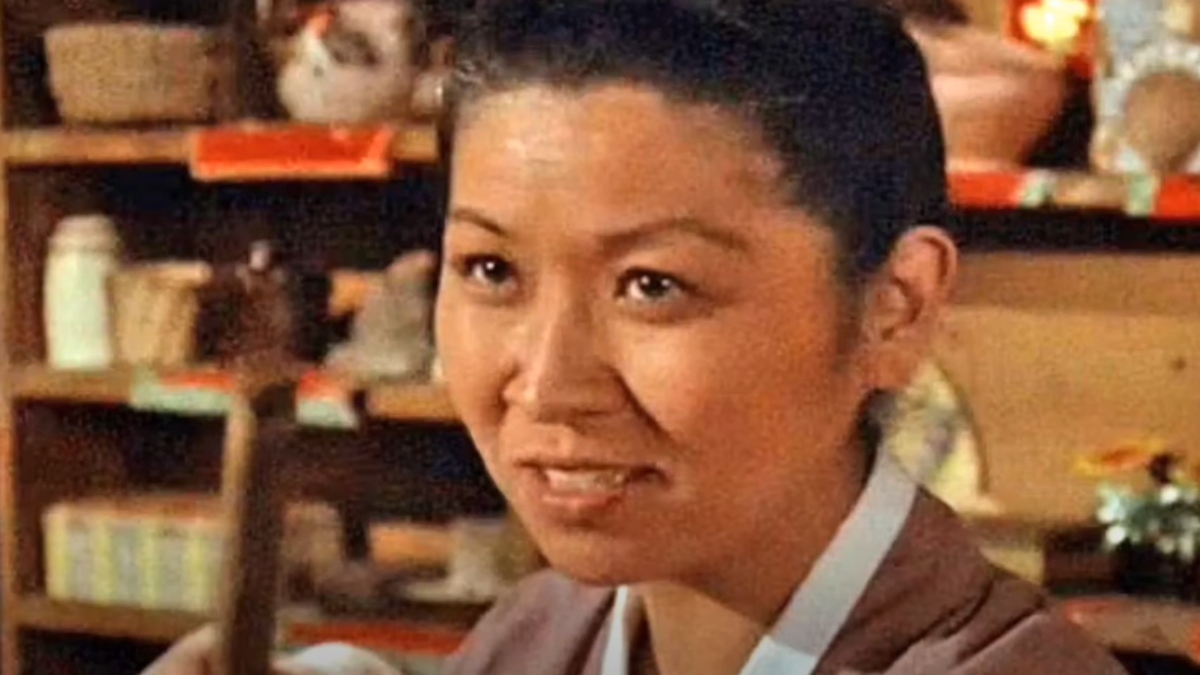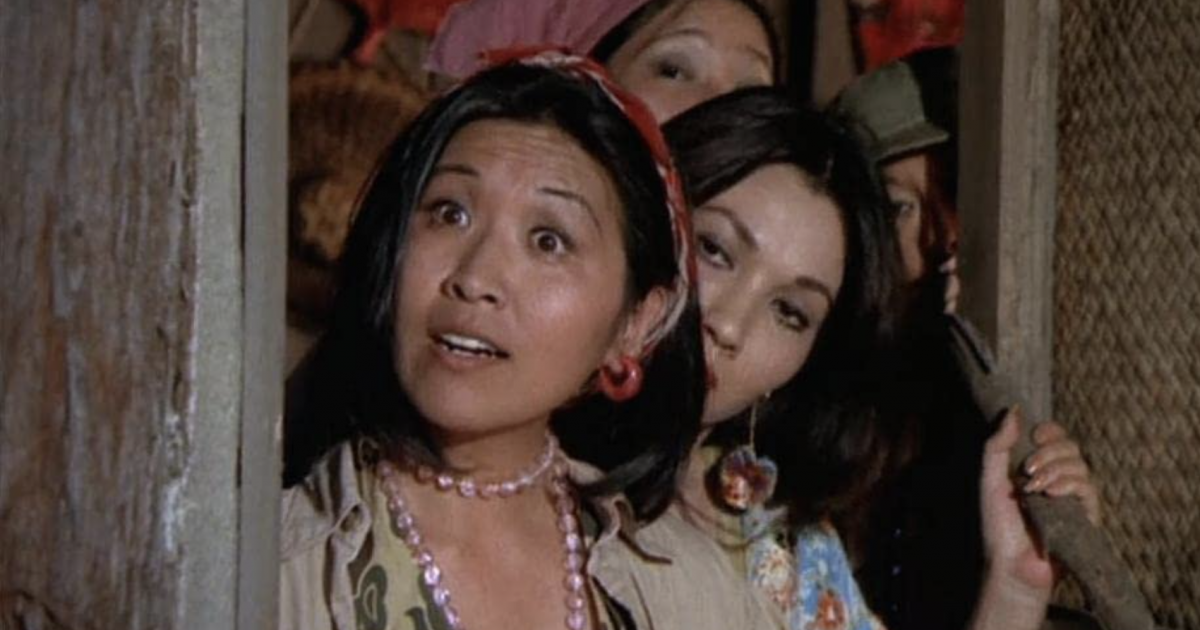Remembering Japanese-American Actress Eileen Saki
- Beloved “M*A*S*H” actress Eileen Saki died of pancreatic cancer earlier this month after being diagnosed in January 2023.
- She was best known for her portrayal of Rosie, the sassy bartender in “M*A*S*H” the sitcom based on the Mobile Army Surgical Hospital that cared for people during the Korean War.
- Pancreatic cancer is an aggressive disease that’s often referred to as the silent killer because it’s difficult to detect before the cancer has spread.
- Treatment for pancreatic cancer, according to Johns Hopkins Medicine, may include surgery, chemotherapy, radiation therapy, vaccination, pain management, immunotherapy and dietary changes.
- To help you explore your clinical trial options, SurvivorNet created the SurvivorNet Clinical Trial Finder an A.I. driven tool updated daily that's built on top of clinicaltrials.gov and gives access to more than 100,000+ individual clinical trials.
So many people know Saki for her role as Rosie, the sassy bartender in “M*A*S*H” the sitcom based on the Mobile Army Surgical Hospital that cared for people during the Korean War. Several actors portrayed the character during the show’s run, but Saki played her the longest (from 1976-1981) and was the last person to fill the role.

“What I remember is happy times, but I know we were very poor, and probably my psyche wanted me to be somebody else, to have a brighter life and entertaining life and that kind of stuff.”
Despite being raised in Japan and English being her second language, Saki was determined to make her dreams come true in the United States. And she did.
After landing her now iconic role in “M*A*S*H,” she went on to have various other roles in films and television shows like 1984's "Splash," the Mel Brooks film "History of the World, Part 1," "Good Times," "Gimme a Break!" and "The Greatest American Hero."
Eileen Saki’s Cancer Battles
Eileen Saki, whose real name was Minako Borgen, was diagnosed with pancreatic cancer in January 2023. We don’t know what her exact course of treatment looked like, but we do know she began chemotherapy in late March, according to an Instagram post by the “MASH Matters” podcast.
View this post on Instagram
“Chemo treatments begin this week, so we are calling on #MASH nation to step up and shower Eileen with love,” the post from March 21, 2023, read. “We hope you will consider sending Eileen a message of encouragement, hope, appreciation, and adoration.
“Email your words of support to: [email protected].”
Brave Pancreatic Cancer Warriors
- ‘It’s Bittersweet:’ Alex Trebek’s Family Gathers On What Would Have Been His 32nd Wedding Anniversary, Raises Funds For Pancreatic Cancer Research
- ‘Bachelorette’ Hannah Brown Reveals In New Memoir She Had Pancreatic Cancer at Age 11; Surgery to Remove An Egg-Sized Tumor Cured Her
- Brain Tumor. Fertility Struggles. Now Pancreatic Cancer. TV Personality Maria Menounos ‘Lucky’ to Catch ‘Silent’ Disease Early
Saki died just over a month later on May 1 at age 79.
“Eileeen Saki passed away peacefully in Los Angeles,” a statement from her representative read. “She was diagnosed with pancreatic cancer in January. She was a lung cancer survivor in 2004. She got a second chance at auditioning and working in the industry that she loved so much she shot a couple big commercials shortly before her diagnosis.
“She was often recognized by face or even just voice by people who knew they knew her ‘from somewhere’ and loved talking to young actors about the journey.”
View this post on Instagram
Saki’s pancreatic cancer battle was short, but fans made sure to show their support along the way. In a statement from “MASH Matters,” we learned that many people wrote emails to Saki during her cancer battle and she loved every one.
“On behalf of her husband Bob, we extend sincere appreciation for the hundreds of M*A*S*H fans who filled Eileen’s final days with peace, encouragement, and love,” the post read. “She read every email and responded to as many as she could.
“We will share more remembrances of Eileen Saki throughout the day. You are invited to do the same. Our sweet, sweet Eileen. How we love you. How we will miss you.”
Learning About Pancreatic Cancer
Pancreatic cancer is an aggressive disease that’s often referred to as the silent killer because it’s difficult to detect before the cancer has spread.
"Because the pancreas is inside the abdomen often doesn't have symptoms that would tell you that something is wrong with your pancreas," Dr. Anirban Maitra, the co-leader of the Pancreatic Cancer Moon Shot at MD Anderson Cancer Center, said.
"By the time individuals walk into the clinic with symptoms like jaundice, weight loss, back pain or diabetes, it's often very late in the stage of the disease."
How Pancreatic and Liver Cancer Survivor Joel Naftelberg Learned to Dance on His Problems
According to the American Cancer Society, “pancreatic cancer seems to run in some families.” Additionally, there are gene mutations (changes) that can be inherited from parent to child that may cause as many as 10% of pancreatic cancers.
That’s why Jessica Everett, a genetic counselor at NYU Langone's Perlmutter Cancer Center, encourages people who are at a high risk level for developing the disease to look into possible screening options.
"If you're concerned about pancreatic cancer in your family, start by talking to a genetic counselor to learn more about your risk and what options you have," Everett said.
Detecting Pancreatic Cancer Early Is Crucial
Treatment for pancreatic cancer, according to Johns Hopkins Medicine, may include surgery, chemotherapy, radiation therapy, vaccination, pain management, immunotherapy and dietary changes. Immunotherapy, in particular, has been making waves in pancreatic cancer treatment, but other types of treatments are being studied all the time via clinical trials research studies that compare the most effective known treatment for a specific type or stage of a disease with a new approach.
"We're encouraged by the trend toward more innovative clinical trial designs to improve the drug development process and ultimately lead to better patient outcomes," PanCAN Chief Science Officer Lynn Matrisian said in a 2022 article from the Pancreatic Cancer Action Network.
Clinical trials do not guarantee you will be given the most effective treatment, so it’s important to know they are not right for everyone. Before getting involved with one, talk with your doctor(s) and consider the following general risks of enrolling in a clinical trial:
- The risk of harm and/or side effects due to experimental treatments
- Researchers may be unaware of some potential side effects for experimental treatments
- The treatment may not work for you, even if it has worked for others
If you or a loved one has pancreatic cancer and you’re curious about clinical trial options, consider using the SurvivorNet Clinical Trial Finder: an A.I. driven tool for patients to find clinical trial options for treatment.
The tool is updated daily and built on top of clinicaltrials.gov a database maintained by the U.S. government that compiles privately and publicly funded clinical trials conducted around the world and gives users access to more than 100,000+ individual clinical trials.
"Clinical trials are critical to the development of new therapies, and as we live through this extraordinary revolution in genomics, immunotherapy and targeted therapy, it's clear that one of the most pressing needs for patients, clinical trials sponsors, and researchers is simply a better way to find patients," SurvivorNet CEO Steve Alperin said. "Even one percent more people successfully enrolled in clinical trials can change the world."
Learn more about SurvivorNet's rigorous medical review process.


